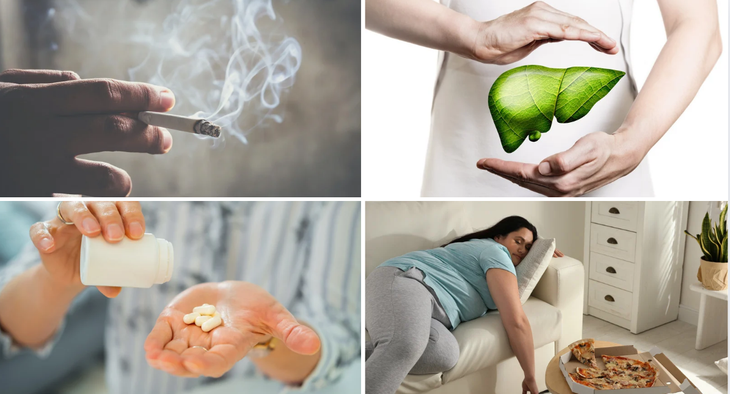
Despite its incredible ability to regenerate itself, the liver is not invulnerable. Many seemingly harmless daily habits can silently "erode" the liver, causing serious diseases such as cirrhosis or even liver failure in the long term - Photo: AI
One dangerous thing is that liver diseases often progress silently, with vague symptoms such as prolonged fatigue, nausea... Only when the damage becomes more severe, signs such as jaundice and yellow eyes become clear.
Here are five common habits that may be quietly damaging your liver.
Excessive drinking
When it comes to liver disease, many people immediately think of alcohol and this is not wrong. When drinking alcohol, the liver must work to metabolize and eliminate alcohol from the body. However, if consumed too much, the liver cannot process it in time, causing toxic substances to accumulate and damage liver cells.
Alcoholic liver disease progresses in three stages: first, fatty liver, which often has no obvious symptoms and can be reversed if drinking is stopped. If drinking continues, alcoholic hepatitis occurs, at which point the liver becomes inflamed and scarred. Finally, the damage progresses to permanent fibrosis, which severely affects liver function.
Even “moderate” drinking over a long period of time can be harmful, especially when combined with obesity or smoking. Experts recommend no more than 14 units of alcohol a week (about six beers or seven glasses of wine), and having at least a few alcohol-free days a week to give your liver time to recover.
Unhealthy diet
Not drinking alcohol doesn't mean your liver is "safe and sound." A diet high in sugar, saturated fat, and processed foods can lead to metabolic fatty liver.
When too much fat accumulates in the liver, the organ will lose its function and become susceptible to inflammation, damage, and scarring. People who are overweight, especially those with abdominal fat, are at higher risk of developing MASLD. The disease is also associated with factors such as high blood pressure, diabetes, and high blood lipids.
Foods high in saturated fat (red meat, fried foods, fast food), sweets, and carbonated drinks are the main culprits. A 2018 study found that people who drank a lot of soft drinks had a 40% higher risk of fatty liver disease than those who drank less.
Conversely, a balanced diet rich in vegetables, fruits, whole grains, legumes, and fish can help reduce liver fat and improve other risk factors such as blood sugar and cholesterol.
In addition, drinking enough water, about 8 glasses a day, also supports the liver in the detoxification process.
Painkiller abuse
Paracetamol (acetaminophen) is a common pain reliever, used by many people to treat headaches, muscle aches, and fever. However, if taken in excess of even slightly above the recommended dose, it can cause serious liver damage.
During the metabolism of paracetamol, the liver produces a toxic byproduct called NAPQI. If overdosed, the liver no longer has enough glutathione to neutralize NAPQI, leading to liver cell damage, even acute liver failure, which can be life-threatening.
It is especially dangerous to take paracetamol with alcohol, as alcohol reduces the liver's ability to break down toxins. Follow the correct dosage and consult your doctor if you have to take the medication regularly.
Sedentary
A sedentary lifestyle not only affects the cardiovascular system but is also a "silent threat" to the liver. When inactive, the body easily accumulates fat, reduces insulin sensitivity and causes metabolic disorders. These are factors that promote fatty liver.
Fortunately, regular exercise can improve liver function, even if you haven’t lost weight. One study found that after just eight weeks of weight training, liver fat decreased by 13%. Walking briskly for 30 minutes a day, five times a week, can also help.
Smoking
Smoking not only harms the lungs and heart, but also damages the liver. Thousands of toxic chemicals in cigarette smoke increase the detoxification burden on the liver, leading to oxidative stress, a condition in which free radicals destroy liver cells and cause fibrosis.
Smoking also increases the risk of liver cancer, due to the presence of many carcinogens such as nitrosamines, vinyl chloride and tar. According to statistics in the UK, about 20% of liver cancer cases are related to smoking.
The liver is a resilient organ but not "invincible". Protecting the liver needs to start with simple habits:
Drink alcohol in moderation
Quit smoking
Use medication as directed
Balanced diet
Exercise regularly
Drink enough water every day
If you notice any unusual symptoms such as prolonged fatigue, nausea, or yellow skin/eyes, don't ignore them. Early detection of liver problems will help in more effective treatment.
Source: https://tuoitre.vn/5-thoi-quen-hang-ngay-am-tham-gay-hai-gan-20250622094024504.htm




![[Photo] Chairman of the National People's Congress of China Zhao Leji begins official visit to Vietnam](https://vphoto.vietnam.vn/thumb/1200x675/vietnam/resource/IMAGE/2025/8/31/fcfa5a4c54b245499a7992f9c6bf993a)


![[Photo] First Secretary and President of Cuba begins State visit to Vietnam](https://vphoto.vietnam.vn/thumb/1200x675/vietnam/resource/IMAGE/2025/8/31/f169c1546ec74be7bf8ccf6801ee0c55)
![[Infographic] Traditional relations and special friendship between Vietnam and Cuba](https://vphoto.vietnam.vn/thumb/1200x675/vietnam/resource/IMAGE/2025/8/31/c4c2b14e48554227b4305c632fc740af)



























![[Photo] General Secretary To Lam receives Chairman of the National People's Congress of China Zhao Leji](https://vphoto.vietnam.vn/thumb/1200x675/vietnam/resource/IMAGE/2025/8/31/5af9b8d4ba2143348afe1c7ce6b7fa04)



























































Comment (0)